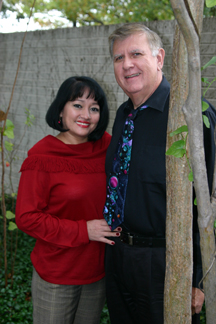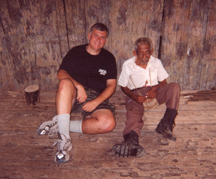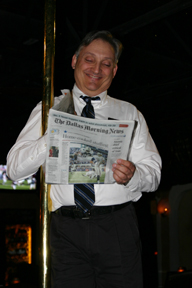Several men were starting their weekend early, relaxing in the dark confines of an upscale gentlemen’s club. Greeting them as they came and went on a recent Friday afternoon was Michael Precker, perhaps the only guy ever to graduate from the Columbia University Graduate School of Journalism, work as a Middle Eastern correspondent, win an award from the Association for Women Journalists, and then work the door at a Dallas strip club.
Manager, chief bottle washer, and “writer in residence” have been his job titles at The Lodge for the past two years, ever since he walked away from daily journalism at The Dallas Morning News.
 “I had never spent a nickel in a club like this,” Precker said. “I’m an old, boring, married person.”
“I had never spent a nickel in a club like this,” Precker said. “I’m an old, boring, married person.”
Now he’s doing everything from arranging lap dances for customers to picking up dancers at the airport to tending bar to mopping up spilled drinks.
Recessions can turn lives topsy-turvy. Careers can ricochet off adversity in all kinds of directions.
Many folks who have lost their jobs in recent months have found other positions in their same line of work or had to find stopgaps to pay the rent. But others who have found themselves unemployed or who, like Precker, saw layoffs coming up in their rearview mirror have taken a chance and shaped totally new careers. “A lot of people are looking at their unemployment as a way to reinvent themselves,” said one local career counselor.
Look no further than Lynn Chilson. The former NASA rocket scientist is merging his corporate experience with a lifelong fascination with spirituality, developing a leadership seminar program, and calling himself the “corporate shaman.”
A local veteran news photographer is now helping sell wigs for cats. You read that right. Wigs for cats.
Welcome to the 2000s, when self-makeover decisions that may look a little crazy to outsiders are sometimes necessary to keep workers sane and put bread on the table.
Gentlemen’s clubs and kitty wigs are just a few of the shelters that workers have found to get themselves out of the current economic storm. With a national unemployment rate of 10 percent (and Texas unemployment at 8 percent, a 22-year high), plenty of people are finding no jobs at all. And even though there are indicators that the recession may be bottoming out, thus far the upswing has been what the experts call a jobless recovery: better for bankers and business owners, maybe, but with not much to cheer about yet for the unemployed.
Some of those who have a little cushion to fall back on or a still-employed spouse are using the downtime to go back to school and learn new skills — or perhaps stay in school longer. Job placement rates for college grads have dropped 22 percent in the past year, said Sherri Mata, career services director at Texas Wesleyan University.
Mata and others recommend that job seekers take a hard look at their skills and think about new ways to apply them. They should also consider taking an “interest inventory” to determine where to refocus, she said.
 “The first thing is determine what it is they want to do,” Mata said. “My second step would be to research those careers and see if they are in demand, how much they pay, what kind of tasks are done on a daily basis, and what kind of skills and knowledge they need.”
“The first thing is determine what it is they want to do,” Mata said. “My second step would be to research those careers and see if they are in demand, how much they pay, what kind of tasks are done on a daily basis, and what kind of skills and knowledge they need.”
Finding a job without experience means convincing potential employers that one set of work skills is transferable to other jobs. Fields in which workers are still in demand right now include counseling, social work, corrections, law enforcement, information technology, healthcare, and graphic arts.
“Some of those will require specific degrees, and many people will have to go back to school to get those certifications and licenses,” she said.
Debby Kratky at Workforce Solutions for Tarrant County has seen many instances of layoffs leading to reinvention, resulting in greater career satisfaction. “It’s born of necessity but oftentimes leads to the type of career that is going to make those people happy in the long run,” she said.
Updating resumés, seeking career counseling, attending job fairs, and, of course, networking are crucial. Reinventing oneself takes all that and more, including a sense of excitement. “If you are passionate about doing something, you are going to do it,” Mata said. “You’ll be motivated and determined.”
Jill Johnson is passionate about animals and photography. So when she took a voluntary buyout and left the Fort Worth Star-Telegram during the industry’s downturn, she found a way to combine those passions.
Still, she said, “I never thought in a million years I’d be taking pictures of cats in wigs.”
Not many cats are named Rooster, and fewer still are content to let someone put wigs on them and take pictures as they lounge on the couch. But Johnson’s 7-year-old rescue cat sat still for a good 10 minutes on a recent afternoon while she draped him in colorful hairpieces and captured his varying moods, quizzical expressions, and sultry glances. Meow, indeed.
For 12 years, Johnson rushed to fires, car wrecks, and floods to snap pictures for the next day’s newspaper editions. But by about 2005, a recession combined with an outdated business model had put the newspaper industry and many other kinds of news organizations into such a steep decline that it’s hard for many to see how they will survive. Newspapers across the country started laying off or offering buyouts to a vast number of editors, writers, and photographers, and they haven’t stopped yet. Paper Cuts, a web site created by St. Louis Post-Dispatch staffer Erica Smith to track job losses in the industry, reports more than 14,000 buyouts and layoffs at U.S. newspapers thus far in 2009. The previous year’s numbers were about the same. Several hundred of those jobs were cut at the Star-Telegram, Morning News, and other smaller newspapers in North Texas.
“I’m still surprised so many kids are in J-school, especially when I see good journalists jumping into other industries,” Smith recently told FishbowlLA, a Los Angeles-based blog about media and the creative community.
Johnson could see only a bleak future for herself at the Star-Telegram. Offered a buyout in June 2008, she was tempted to take it but faced a quandary. She was being offered about $10,000 – the same amount of money it would take her to buy cameras, lenses, and other equipment she would need to continue working as an independent, professional photographer.
“All the camera gear was owned by the paper,” she said. “I kept debating, how am I going to take a buyout if all my buyout money had to go toward the gear?”
 She was still stewing it over when she received a call from Julie Jackson, a Dallas-based author whom Johnson had met several months before.
She was still stewing it over when she received a call from Julie Jackson, a Dallas-based author whom Johnson had met several months before.
In late 2007 Jackson was creating a web site to promote an oddball idea she’d come up with: creating wigs for cats. She asked Johnson to take a few photos of a cat in tiny wigs. Jackson’s premise for the web site was simple: She enjoyed blowing off steam by donning a bright wig, putting one on her pet cat, listening to loud music, dancing, and basically just cracking herself up.
“This has brought such great stress relief, particularly during the holidays, that we decided to share our passion for wigs with the world,” Jackson wrote on her web site – and by “we” she means herself and her cat, Boone.
Jackson needed a photographer with talent, a sense of humor, and the patience to work with a fidgety cat bedecked in a cumbersome wig. Johnson agreed to take the pictures. Her payment? A free wig for her own cat.
A couple of months went by, and Johnson had almost forgotten about the Kitty Wigs web site when she got a phone call from Houston.
“My mother said, ‘Oh my God, turn on CNN’s Anderson Cooper!’ ” Johnson recalled. The online photos at kittywigs.com were being shown on Cooper’s AC360 in a segment called “What Were They Thinking?”
“The Kitty Wigs craze started after that,” Johnson said.
Other shows and publications jumped on the bandwagon, which led to a book deal with San Francisco-based Chronicle Books. Glamourpuss: The Enchanting World of Kitty Wigs offers glossy photos of cats in different wigs, each accompanied by a silly caption.
In June 2008, Jackson called Johnson to tell her about the book deal and to offer an advance payment for taking more pictures. That deal gave Johnson the confidence to take the Star-Telegram‘s buyout offer and become self-employed for the first time in her life.
“The money I got for Kitty Wigs paid for my gear and allowed me to get on my feet as a freelancer,” she said. “It was like a blessing from the photo kitty gods.”
Spending the next two months taking pictures of cats in her Fort Worth living room was an adjustment.
“Going from [being] a serious journalist at a newspaper for 12 years and then spending two months putting wigs on cats was one of the most interesting job juxtapositions I’ve ever had,” she said. “I went from serious stuff to the most silly and ridiculous photography ever. At first I thought, ‘My God, people are going to think I lost my mind.’ Then I thought, ‘Screw it. I might as well be as goofy as possible and make some money.’ “
The book started a media steamroll that saw Kitty Wigs mentioned in BusinessWeek, People, The National Enquirer, Reader’s Digest, Publisher’s Weekly, and in numerous newspapers across the country. TV talk show hosts Jay Leno and Conan O’Brien poked fun, and morning talk shows like Good Morning America spotlighted the kitty wigs.
At book signings and promotional events on radio and TV, Jackson and Johnson wear gaudy wigs and have more fun than their cats ever thought about having. A Kitty Wigs calendar is scheduled for 2011.
“It’s been really fun and so silly,” Johnson said. “It’s all about not taking life so seriously.”
That’s not a bad mantra for somebody who was standing at a pivotal crossroads not long ago, facing a career hiccup and wondering what the future might hold.
Career reinvention hasn’t come as quickly or easily for Lynn Chilson. He spent 15 years as an engineer and program manager at NASA, working on the space shuttle system at the Johnson Space Center. In 1991 he started his own company, Chilson Enterprises, in Houston and did consulting work on space programs and in related fields. At one time he had 26 workers on his payroll.
In 1997 he moved to Dallas to focus on the telecom field, with GTE as his principal client. Later he moved to Egypt to consult with a startup company. Once that contract ended, Chilson focused less on consulting and turned his attention to holistic training, an area that had long fascinated him. In 2000, he started making regular trips to South American jungles to study with shamans, mediums between the real and the spirit worlds. His travels included ingesting hallucinogenic plant substances to achieve visions and enlightenment.
He had eschewed mind-altering substances all his life. After all, he was working in the space program with its top-secret security clearances back in the 1980s and 1990s. His interest in the space program didn’t necessarily jibe with his exuberance for shamanism, and he kept much of his knowledge and experiences to himself back then. Still, the business card he designed in 1991 features a rocket flying over a yin-yang symbol, along with his company motto: “The Most Powerful Technology Is Still The Mind.”
In Peru, he met his future wife, Corina, and adopted her two children. The family moved to Dallas, and Chilson spent the next couple of years living on his savings while helping them adjust to their new lives in America.
“At the end of 2005 I realized I needed to go back to work and start consulting again,” he said. But things had changed.
 “By stepping back for that amount of time, my networks had gone stale,” he said. The telecom industry was flagging, and he’d been away from Houston and the space program so long that his reputation as a viable consultant had faded.
“By stepping back for that amount of time, my networks had gone stale,” he said. The telecom industry was flagging, and he’d been away from Houston and the space program so long that his reputation as a viable consultant had faded.
“Once you step away from that world, it goes cold in a hurry,” he said. “I’m 55. There is a new generation there.” His last corporate contract ended a year ago. In the past, one contract had led to the next. No more. This year he has spent hundreds of hours, by his estimate, seeking a job in his field.
Once it became clear to him how hard it would be to resume his old career, he scrambled to create a new one to support his wife and children. And he’s still scrambling. “I’m definitely a work in progress,” he said. “We’ve got bills that need to be paid, and we’ve just about spent all the savings.”
Closed door after closed door made him leap outside the proverbial box and consider alternative ways to make a living. His new plan: Combine 30 years of corporate experience with his love of mysticism and develop a self-help seminar geared for the business world. A shaman’s mind-set might improve leadership and morale, creating a more contented workforce.
“As I thought of all those things I’ve read and learned, going back to Plato, it suddenly dawned on me one day what’s missing in corporate America – a return to basics, that inner self,” he said.
A dozen years ago he read The Corporate Mystic: A Guidebook for Visionaries with Their Feet on the Ground and enjoyed its premise, but he didn’t think the author nailed the subject matter. Chilson figured he could do better, and he has begun writing a book called The Corporate Shaman. The dot-com domain name was already taken, so he established thecorporateshaman.org and is developing a business leadership course under the same name.
 “I’m going to start trying to reinvent myself as a mentor for corporate America using the wisdom of the shaman,” he said.
“I’m going to start trying to reinvent myself as a mentor for corporate America using the wisdom of the shaman,” he said.
Sure, shamanism is viewed as mumbo jumbo in many quarters. Developing a program that shares the mind-set without scaring off the customers can be tricky. He envisions a moderate approach that includes taking real business practices and disciplines and adding to them holistic approaches such as meditation, breathing, chanting, and other techniques to reach altered states.
“Part of my task is to distill the message of what these guys do and try to package it so that leaders of companies get the idea,” he said. “We obviously can’t drink the vision vine in the United States or take the mushrooms.”
Eventually he plans to offer a more advanced approach, perhaps even leading corporate tours to the jungles for spiritual enlightenment.
With two children still living at home, Chilson is feeling the pressure to provide. Letting go of his old career and expectations and embracing a fresh approach was the first step to rebirth, he said.
“I’ve had to reinvent myself along with millions of others,” he said. “I know a lot of folks who have been pushed out and are still trying to find that job they’ve always had, and they’re living on their savings.”
Judith Briles has met many people in Chilson’s shoes. A Denver Business Journal columnist and author of The Confidence Factor and Money Smarts for Turbulent Times, Briles said maintaining a positive attitude goes a long way toward finding a new career.
Her son was laid off from his job at a mortgage company a couple of years ago and had to take a job in a new field, telecommunications, at a greatly reduced salary. Since then, however, his salary has increased a bit, and he’s enjoyed the change.
Others, such as Chilson, try to make it on their own.
“I’m seeing more and more people going into their own businesses,” Briles said.
Change, even for old-timers, is healthy, she said.
“I look at it as an opportunity to say, ‘Is there something else I’d rather do?’ and then learn more about it,” she said. “It’s good for the brain.”
Chilson is following her advice, creating a small business, maintaining a positive attitude, and pursuing something he loves.
He believes that adopting ancient philosophies is a good place to start to overcome the ills besetting the American economy. Outsourcing jobs to foreign countries, technological advances, a growing separation between the rich and poor, age discrimination, and many other issues are dogging the U.S. workforce – and indicating the need for corporate America to rethink its standard operating procedure, he said.
“We’ve been so focused on the new things and what youth can bring, the vitality of youth, that we’ve thrown away the wisdom of the ages,” he said. “What this book is going to do is touch on what I think the key concepts are of how that ancient wisdom can be applied to the needs of business.”
His wife is supportive and confident. “He’s a very smart man, very strong,” Corina Chilson said. “He is very positive.”
She looked lovingly at her husband, who beamed.
“With a cheering section like that, how can I fail?” Chilson said.
Last week, however, he discovered a potential stumbling block. Another book entitled The Corporate Shaman was published in 2002. A Google search revealed several people in the United States billing themselves as some version of a corporate shaman. Still he isn’t deterred.
 “I didn’t know those were there, but I’m still going to do mine,” he said. “I’ve been thinking about this for a lifetime. I’m certainly not going to plagiarize their stuff. I haven’t even read it.”
“I didn’t know those were there, but I’m still going to do mine,” he said. “I’ve been thinking about this for a lifetime. I’m certainly not going to plagiarize their stuff. I haven’t even read it.”
Self-help books and programs aren’t unique, and Chilson said he will “put my two cents in from my perspective.”
Whether his approach will lead to a steady income remains to be seen.
“It’s what they used to call gut-check time,” he said. “Will I fail? Will I be totally destitute next year? I hope not. But I know I’m not making a living doing the job I was trained to do. I’m going to take my love of the universe and see if I can blend it with the world we live in.”
The first round of layoffs at The Dallas Morning News came and went in 2004, and veteran newsman Michael Precker dodged the bullet, just as he had literally dodged bullets while covering violence in Israel and other countries. But he figured his luck was running out when the newspaper offered voluntary buyouts two years later and indicated that future offers might not be as generous.
He and his co-workers would go to lunch, lament the state of journalism, and discuss their prospects. Few people knew what to do next.
“I didn’t have a Plan B,” he said. “Like most people, I was scared to leave and scared to stay.”
What seemed obvious was that his style of journalism – in-depth coverage of faraway places and oddball features with local angles – wasn’t appreciated much anymore.
At a charity dinner he ran into Dawn Rizos, a strip-club owner whom Precker had interviewed in the past for news articles. He jokingly told her that newspapers were sliding and he might be applying for a job at her club. She surprised him by saying she’d hire him. He laughed it off.
Not long afterward, he took a vacation to Tel Aviv and was there when a bombing occurred. In the past, he would have laced up his boots, grabbed a notebook, and scrambled out the door looking for witnesses. This time was different. Maybe he was a little older, a little wiser, or maybe he was just soured with the sorry state of journalism.
“I didn’t have any urge to run to the border and be Geraldo Rivera and explain to the American people what was happening and then come back and brag about how I’d almost got my ass shot off,” he said. “It was kind of an epiphany. It was time to do something else.”
He was a husband, a father, and a journalist, who at 51 didn’t know what he wanted to be when he grew up.
When he returned to Dallas, he got a surprise. Rizos had written him a letter saying she was serious about the job offer. She admired his writing abilities and thought they would come in handy for club promotion, but she also liked to hire smart, hardworking people regardless of experience.
When the voluntary buyout day arrived in the newsroom, co-workers were surprised when Precker announced he was taking the money and leaving after 25 years at the News. They were shocked when he told them about his new work plans.
“Nobody could believe a serious journalist was going to work at a strip club,” he said.
He started his new job in January 2007 and learned the ropes of dealing with customers and dancers. He arrives at 9:30 a.m. each day, helps prepare the club for opening, caters to customers, oversees dancers, and does any number of duties before leaving around 7:30 p.m. each night. “I enjoy the day here,” he said. “It’s interesting.”
For a while, going through the door at The Lodge felt like entering the Twilight Zone. Take the day not long after he was hired when he walked into work and noticed a bare stage.
“Isn’t there supposed to be a girl on Stage Two?” he said to somebody. “Then I thought, ‘Am I really saying this?’ I’ve shaken hands with King Hussein. Where am I?’ “
He was in his new life, at his new job of managing a strip club, and it was up to him to find the missing dancer and get her on stage.
He’s happy to be a part of this new career, even though it wasn’t his first love.
For years he took pride in telling people he was a news reporter and foreign correspondent. He’d dreamed of being a reporter since he was in the seventh grade. Now he takes pride in telling people that he works for “the best, classiest, most elegant, least disrespectful gentlemen’s club in Dallas.”
Looking ahead, even from the front door of a Dallas strip club, is better than yearning for a past that no longer exists.
“I’m nostalgic for what newspapers used to be, not for what they are now,” he said.
The same could be said by lots of folks about their old professions. Out of the box, they figure out new definitions of who and what they are – and in the process, figure out how they’re going to make it through some tough times.











